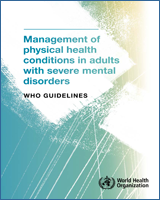5.1. Publication and Dissemination
The guidelines are disseminated as a print publication and electronically on a dedicated internet space on the WHO website (http://www.who.int/mental_health/evidence/guidelines_physical_health_and_severe_mental_disorders/en/index.html).
WHO publications, training and clinical management manuals will be revised to reflect the updated recommendations. A range of subsidiary products will be developed to support the implementation including job aids and policy briefs.
The guidelines and products are developed in English, and will be translated into other WHO official languages for wider dissemination and in collaboration with WHO Regional Offices.
Dissemination will be supported by publication of selected systematic reviews and evidence in peer review journals, and presentations and workshops at key conferences and events.
5.2. Monitoring and Evaluation
Implementation of the recommendations will be monitored at the health facility level. Facility data will be collected through surveys or routine health information systems. Special studies can be considered where routine monitoring is not feasible or appropriate.
WHO will continue to solicit and collect regular feedback through process indicators by Ministries of Health regarding implementation activities in order to evaluate the impact and usefulness of this guideline. This feedback will also identify areas where improvement is warranted.
5.3. Implications for Further Research
While evidence for mental health treatments is strong, the evidence for effectiveness of interventions to prevent and treat physical conditions in those with SMD is limited. Interventions developed for the general population geared at non-communicable diseases, infectious diseases or other health problems are likely as effective for persons with SMD but given the special needs of this population, interventions for SMD require tailoring. However, more research is needed on the degree of tailoring required. For this, it is essential to include people with SMD in research studies to a much greater extent than is being currently done.
For current evidence-based interventions, research is needed on optimal length and dose needed to positively affect health, which will also be important for resource allocation. Multimodal approaches, which can include behavioural plus pharmacological interventions and include components such as peer support or technology are promising, but have yet to be studied systematically to clarify whether or which multicomponent programs are effective, and which components of the intervention are most beneficial. Many people with SMD have multiple cardiovascular and other risk behaviours which may be modifiable, and future research should test interventions addressing multiple risk factors, as well as those which are directly linked to mortality.
Cost-effectiveness models of different approaches in people with SMD are important, especially in low resource settings, as we aim to achieve universal health coverage and to address the physical health needs of this vulnerable population.
Research is needed to identify and manage barriers to and facilitators of implementing evidence-based guidance and policy recommendations. We need to understand how to deliver evidence-based interventions successfully in the real world, taking into account training and workforce issues and often-limited resources in local community settings. We need to understand to what extent interventions and programmes could or should be disseminated across countries.
Another important area of research will be to assess the effects of health system and policy interventions on excess mortality in SMD. We need to understand why those with SMD have not benefitted from trends in the general population towards reduced mortality in some diseases and smoking cessation. Researchers should take advantage of natural experiments and also design studies in health systems and at the population level to evaluate the impact of these programmes.
Finally, to gain a better understanding of the different perspectives involved, qualitative research is needed to understand the experiences of users, providers, family members, as well as professionals’ receptivity to education and training.
5.4. Future Review and Update
These guidelines will be reviewed in three to five years, unless an earlier review and update is warranted by breakthrough research. New evidence in these areas is regularly monitored by the WHO Secretariat, in consultation with GDG members and technical experts identified for the evidence review process, WHO collaborating centres, and academic institutions.

